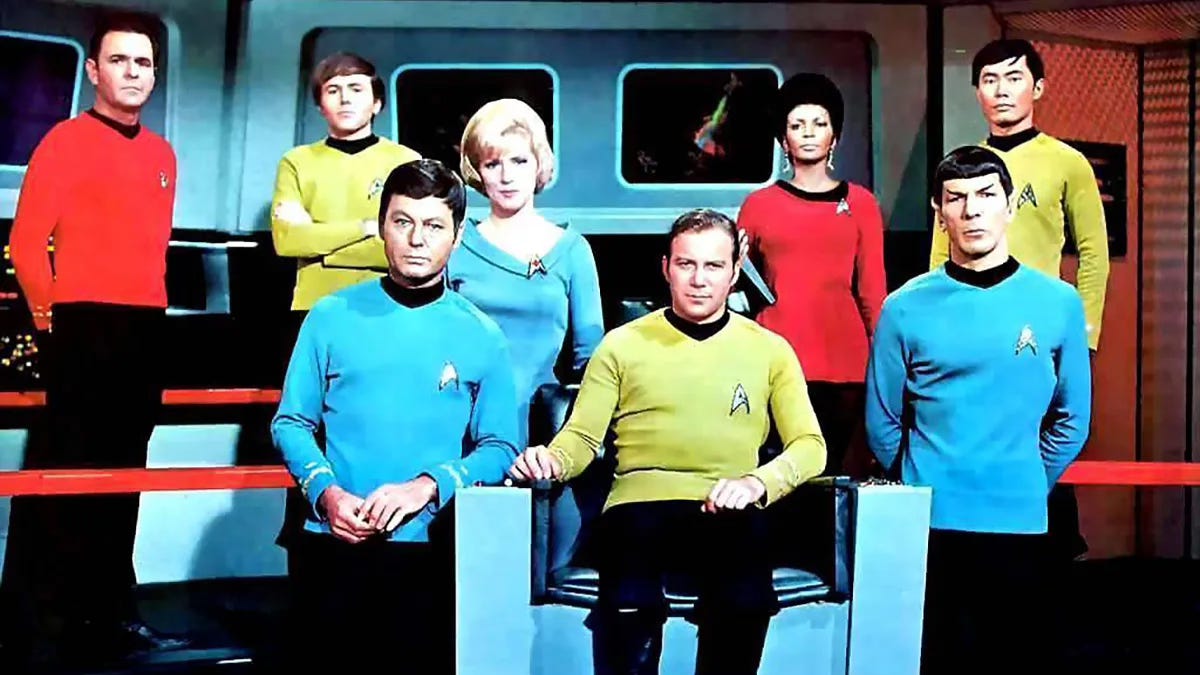Star Trek Made Me a Futurist
To Boldly Go...
I can still remember the first time I heard the whoosh of a sliding starship door. The glow of the bridge, the calm authority of Captain Kirk (and later, the cerebral command of Jean-Luc Picard), and that melodic hum of the Enterprise drifting through space—it all felt like prophecy, not fantasy.
Long before I ever coded an algorithm, helped launch a startup, or stepped into the world of exponential technologies, Star Trek quietly rewired my brain. It made me a futurist—not because it predicted the future, but because it invited me to participate in shaping it.
A Blueprint for Optimism
While so much of science fiction paints a bleak future, Star Trek offered something radically different: a civilization that had figured things out. It envisioned a society that had overcome its worst instincts and matured into something greater.
It wasn’t just entertainment—it was strategy. It was a framework for how we might transcend the noise of the present and build something extraordinary.
In a world spiraling with AI disruption, unstable geopolitics, and technological overload, Star Trek’s calm, confident vision of the future feels more relevant than ever.
Roddenberry’s Real Superpower: Seeing What Could Be
To understand the power of Star Trek, you have to understand Gene Roddenberry—not just as a creator, but as a futurist in his own right.
Roddenberry didn’t just write scripts; he designed possible futures. He imagined worlds shaped by cooperation, exploration, and disciplined moral clarity. His real genius wasn’t in predicting specific technologies—it was in modeling a way of thinking. One that didn’t just extrapolate trends, but asked: What future is worth fighting for?
That mindset is something we can all emulate. It doesn’t require a spaceship. Just imagination, courage, and the discipline to think beyond the immediate.
Curiosity: The Prime Directive of a Futurist
One of Star Trek’s greatest gifts was embedding curiosity as a core virtue. Every mission began with a question. Every leap into the unknown was a conscious act of wonder.
That habit shaped how I think today. As a technologist and entrepreneur, I’ve learned that asking better questions is the starting point of any real breakthrough. It’s not about knowing—it’s about seeking.
This principle isn't just logical—it’s spiritual. “Ask, and it shall be given you; seek, and ye shall find.” That ancient scripture still holds true. The future is not handed to the passive. It rewards the curious.
Today, I still follow this compass. I explore the edges. I connect patterns. I sit with questions others avoid. Because that’s where the breakthroughs live.
Becoming Future-Ready Is the Real Challenge
Here’s the hard truth: humans don’t naturally embrace change. We’re wired for habit, not disruption. But we’re being pulled—whether we’re ready or not—into an age where the rate of change is doubling faster than ever before.
We call it “exponential,” but what’s happening now is double-exponential.
AI, robotics, quantum computing, 3D printing, new materials, synthetic biology—they’re not just evolving. They’re converging. The Star Trek reality isn’t a century away. It’s coming into focus over the next ten years.
Think about it:
Tricorder? That’s your health wearable.
Communicator? In your pocket.
Holodeck? Ask the next-gen VR labs.
Replicator? Try today’s 3D-printed homes and organs.
The future is arriving fast. But the bottleneck isn't the tech. It’s us.
Are we prepared emotionally? Mentally? Spiritually?
Are we ready to rethink identity, work, meaning, even life itself?
That’s the real challenge: to upgrade the human operating system.
Still Boldly Going
As I build, design, and imagine what comes next, I often find myself back on the bridge of the Enterprise—not for nostalgia, but for guidance.
Star Trek didn’t give me the answers. It gave me better questions.
And more importantly, it gave me a reason to believe that the future can still be meaningful—if we’re bold enough to shape it.
So yes, Star Trek made me a futurist.
And like the show itself, I intend to boldly go—curious, creative, and committed to building a world that reflects our highest potential.
Let’s make it so.


You are my favorite futurist! My Polymath person